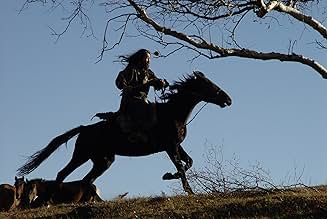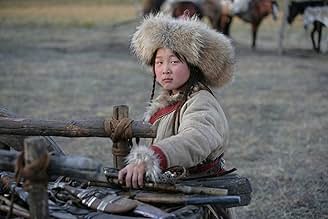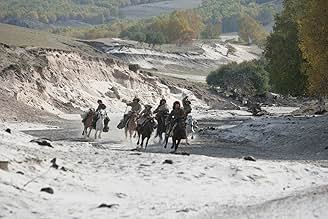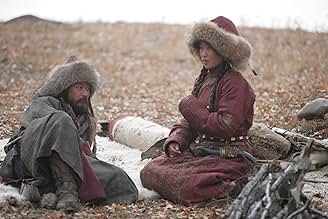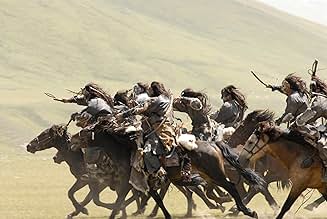Le vicende dell'infanzia, dell'adolescenza e dell'ascesa al potere del giovane Temugin, al secolo noto come Gengis Kahn, il grande conquistatore che, all'inizio del 13mo secolo, riuscì a riu... Leggi tuttoLe vicende dell'infanzia, dell'adolescenza e dell'ascesa al potere del giovane Temugin, al secolo noto come Gengis Kahn, il grande conquistatore che, all'inizio del 13mo secolo, riuscì a riunire le tribù mongole sotto il suo comando arrivando a conquistare gran parte dell'Asia.Le vicende dell'infanzia, dell'adolescenza e dell'ascesa al potere del giovane Temugin, al secolo noto come Gengis Kahn, il grande conquistatore che, all'inizio del 13mo secolo, riuscì a riunire le tribù mongole sotto il suo comando arrivando a conquistare gran parte dell'Asia.
- Regia
- Sceneggiatura
- Star
- Candidato a 1 Oscar
- 16 vittorie e 13 candidature totali
- Oelun - Temudjin's Mother
- (as Aliya)
- Esugei - Temudjin's Father
- (as Ba Sen)
- Sorgan-Shira
- (as A You Er)
- Altan
- (as Hong Jong Ba Tu)
- Daritai
- (as E Er Deng Ba Te Er)
- Girkhai
- (as Su You Le Si Ren)
Recensioni in evidenza
You know how they say history was written by the victors? That's true for everyone but the Mongols. Most of their history was written by the Chinese, Russians, Arabs, and other conquered peoples who had an interest in perpetuating Genghis Khan = bloodthirsty savage.
The movie is based on one of the few sources about Genghis khan written in Mongolian. It's called the secret history of the Mongols and was written shortly after he died as a record for the Mongolian royal family. He was just a chieftain's's son of a very minor tribe. That's what makes this story so impressive, he didn't start out as a king or a prince with a huge army, like Alexander. Everything he had, he had to earn. He didn't get to be Genghis Khan until he was in his 30's. He was always aware of how victory wasn't assured but had to be paid for with planning and strategy. He wasn't a saint by any means but he wasn't an unthinking savage. This movie is actually meant to be the first in a trilogy with the second one probably detailing his conquest of north china and the third the conquest of the Khwarezim empire in Iran and Afghanistan.
This is an approach that I like because the Alexander movie died on account of it trying to condense all of his conquests into one movie.
The performances are passable with special thanks to Honglei Sun, with an engaging turn as Temudjin's long-time friend and ally Jamukha but the film has a rushed quality to it that is predominantly the fault of the screenplay. We jump too quickly from one scene to the next, the tension is constantly disrupted, and the characters are, for the most part, one-dimensional, void of quirks and personal histories and any of the other qualities that might make them relatable. I'm not asking for anything fancy: theirs was a tribal culture constantly engaged in the act of survival, and any philosophical rants or emotive confessionals would feel forced and inorganic, but none of that pardons the film for the simple crime of not giving its characters enough to do. The needs of the plot seem to dictate their actions, rather than the needs of the characters driving the plot.
The biggest casualty, as always, is the love story. Ironically enough, Temudjin and Borte generate the most chemistry when they meet as children, Borte commanding him with a freeness of spirit that gets less and less visible as the movie progresses to pick her as his bride. Unfortunately, their subsequent romance is more about desperate rescues and long-winded goodbyes than it is the simple moments of intimacy that make a relationship believable.
That said, the cinematography is tremendous and the costumes top-notch, and the casting department deserves a couple extra bushels of brownie points for picking actors who unlike many a Hollywood ensemble look like they could actually survive the conditions they supposedly inhabit. The combat scenes are captivating and cleverly shot, and despite the inevitable comparison to such battle-heavy epics as Lord of the Rings and Gladiator, Bodrov keeps a handle on things, never letting any of the battles run beyond the five minute mark, endowing the film with an element of realism and restraint where many of the other so-called epics go completely over the top. True, the movie relies a bit more heavily on CGI than I would prefer, but the Mongolian landscape, the real star of the show, is so gorgeous, so demanding, so jaw-droppingly authentic that we quickly forget our visual grievances and get lost in the rudimentary act of watching.
A pity we can never lose ourselves completely.
Contradicting the Western (and Russian) image of Genghis as the monstrous conqueror, Bodrov's work is influenced by Lev Gumilev's "The Legend of the Black Arrow" and is based on "The Secret History of the Mongols," the 13th century Mongolian account, unknown until its re-emergence in China 700 years later. For a director, who learned in school only about the horrors of Russia's 200-year subjugation by the Mongols, taking a "larger view" is a remarkable act.
Unlike Omar Sharif in the 1965 Henry Levin "Genghis Khan" or Takashi Sorimachi in Shinichiro Sawai's disappointing 2007 "To the Ends of the Earth and Sea," Tadanobu Asano in Bodrov's film is strictly Temudjin, not the great Khan. He lived from 1162 to 1227, and "Mongol" covers the years between 1171 and the beginning of the unification of Mongolian tribes around the turn of the century.
In fact, the spookily powerful child Temudjin (Odnyam Odsuren) dominates the first part of the film, undergoing trials and tribulations that make the lives of Dickens' abused and imperiled children look like a picnic. From age nine into his 30s, Temudjin was orphaned, hunted, imprisoned, enslaved, and constantly threatened by extinction. Literally alone in the vast landscape (brilliantly photographed by Rogier Stoffers and Sergei Trofimov), Temudjin escapes death repeatedly, at times almost mysteriously.
"Mongol" is huge - with endless vistas and epic crowd scenes, quite without special effects - but Bodrov keeps the setting just that, never strutting visuals for their own sake. The film is about people, and the cast is magnificent. Asano's face and eyes hold attention, and make the viewer experience simultaneous feelings of getting to know the character he plays and being held at arm's length. Bodrov and Asano escape all the many Hollywood pitfalls in making an epic - they present nothing easy, predictable, trite. The term "Shakespearean" is used here advisedly.
The Mongolian actors are sensational: Khulan Chuluun is luminous as Borte, Temudjin's wife; Borte's 10-year-old self, the girl who chooses Temudjin, then 9, while he thinks he is the one making the decision, is unforgettable, even if the name is hard to remember: Bayertsetseg Erdenebat.
Chinese actors are vital to the film. As Temudjin's father (poisoned by Tatars before the boy reached 10), Sai Xing Ga makes an impression few actors can achieve in such a brief appearance. Nearly overshadowing Asano is the grand thespian exercise from Sun Hong-Lei, as Temudjin's all-important blood brother Jamukha. Sun is almost too big for the big screen, perhaps a less intense performance would have served the film better.
Another problem is near the end of "Mongol," with Borte's stranger-than-fiction (and actually fictional) rescue of Temudjin from a Tangut prison, years, hundreds of miles, and impossible alliances and dalliances telescoped into a few near-incongruous minutes - all to cover a 10-year-long gap in Genghis' history. Except for that, however, Bodrov's work is engrossing, spectacular, and memorable.
How Genghis Khan got to be Genghis Khan, in short, is one thing this movie doesn't begin to try to explain. Could anyone? That I don't know; but 'Mongol' presents its biographical narrative without the connectives that make sense of a life. Despite lots of dramatic scenes with snappy dialog, striking images, and above all computer-assisted battles with crunching bones and crackling arrows and ringing swords, the film has an epic style without epic themes because its great issues are not so much resolved as abruptly, magically removed. This may in fact be more an epic love story than anything else. It is that in the backhanded way the 'Odyssey' is a love story, because, though Temudjin is away from Borte a lot of the time as Odysseus is mostly away from Ithaka and Penelope, 'Mongol's' opening sequence gives Borte a primary importance, because she (as played by Bayertsetseg Erdenebat), belonging to another tribe, a liberated young woman of the twelfth century, isn't chosen by but chooses Temudjin when he's nine years old and she's ten. It's not supposed to be that way--and maybe it wasn't; it seems a bit implausible. Temudjin is traveling with his Khan (tribal chieftain) father (Ba Sen) on their way to placate another tribe by choosing the boy's wife from their girls. When they don't, the father is promptly poisoned by the other tribe. And its leader, Targutai (Amadu Mamadakov), vows to kill Temudjin--but not for a year or so, because "Mongols don't kill children."
Well, what Mongols do or don't do seems up for grabs, and probably at the time, historically, "Mongol" itself must have been a rather vague concept. In fact that is another running theme: what's a Mongol? What are their primary values? There is no satisfactory answer, though killing and stealing are advanced as major concepts.
Surprisingly, since not too many are "to the right of Genghis Khan," and since he succeeds in wiping out all his enemies, Temudjin as played (as an adult) by the imposing Tadanobu Asano is a gentle-faced, zen-like fellow who's a strong advocate of fair play. Tadanobu, along with the somewhat over-histrionic Chinese actor Honglai Sun as Jamukha, his childhood blood brother and eventual arch rival, are both impressive. But the real star, with some substantial help from computer-generated effects, is the vast landscape of steppe, snow, mountain, and sky that dominates many scenes. With effective use of lenses and light, the filmmakers have created an epic look, and it's this, plus the authoritative acting, that make this film worth viewing--but only if you like this kind of thing and if you don't mind that you're not going to emerge from it with any historical knowledge. Said to be the first of a trilogy. One will approach the sequels with a certain reserve.
Shown as part of the San Francisco International Film Festival April-May 2008 and in US theatrical release June 2008.
It's not a bad story, either, although not one that will keep you riveted to the screen for the full two hours. However, I wasn't bored, either, although some of the action scenes looked too repetitive with very hokey-looking special-effects concerning blood splashing out of people in the battle scenes. It did not look real, but as if it were drawn. It's ironic in that the production values seem to be so high with a such a nicely-filmed effort, yet the action scenes are staged like a B-movie.
In a nutshell, this is the story of how "Genghis Kahn," who is "Temudjin" throughout the movie, spent his tough early life and how he became the famous warrior. We just see how many hardships the man endured to become who he was later in life. He was never referred to as Genghis Kahn which, I learned hear, is a title more than a name. That must have come later, after he had control of all the Mongol armies, which is where the film ends.
Many times, it's a not a pleasant existence for "Temudjin," who was marked man from the age of nine. We see him spend many lonely hours held captive in different places. The looks on his face are memorable. Odnyam Odsuren ad the young "Temudjin" and Tadanobu Asano as the adult "Temudjin" both had extraordinarily photographic faces.
One of the few problems I had with the movie were understanding "the rest of the story" as certain scenes ended abruptly leaving me (and I assume other viewers) wondering "what happened?" His friends, though, were fun to watch and his bride was a beautiful, kind and strong woman, as pictured in this movie. Actually, I found this just as much of a love story as a war epic, and the romance angle was far more dramatic. The devotion the lead male and female had to each other, and the faithfulness and loyalty were inspiring, to say the least.
Lo sapevi?
- QuizDirector Sergei Bodrov and Production Designer Dashi Namdakov visited Mongolia's chief shaman in the capital city of Ulan Bator, so that they could ask permission to film a movie about Genghis Khan's life. The shaman told them that of all the people who have talked about making such a film, they were the only ones to ask his permission.
- BlooperThe Mongolian tribes, including the hordes that conquered their vast empire, rode on a very peculiar race of horses, stocky build, with relatively short legs and a large head. The horses used in the movie look like ordinary western horses
- ConnessioniFeatured in The 80th Annual Academy Awards (2008)
- Colonne sonoreBeginning
Composed By Tuomas Kantelinen
Performed by Hamburg Film Orchestra, The London Session Orchestra, One Orchestra, Altan Urag
© 2008 X-Filme Creative Pool GmbH.
(p) 2008 Kinofabrika GmbH & Tuomas Kantelinen Ensemble.
I più visti
Dettagli
- Data di uscita
- Paesi di origine
- Lingue
- Celebre anche come
- Mongol: The Rise of Genghis Khan
- Luoghi delle riprese
- Inner Mongolia, Cina(location)
- Aziende produttrici
- Vedi altri crediti dell’azienda su IMDbPro
Botteghino
- Budget
- 18.000.000 USD (previsto)
- Lordo Stati Uniti e Canada
- 5.705.761 USD
- Fine settimana di apertura Stati Uniti e Canada
- 135.326 USD
- 8 giu 2008
- Lordo in tutto il mondo
- 26.527.510 USD
- Tempo di esecuzione
- 2h 6min(126 min)
- Colore
- Mix di suoni
- Proporzioni
- 2.35 : 1







